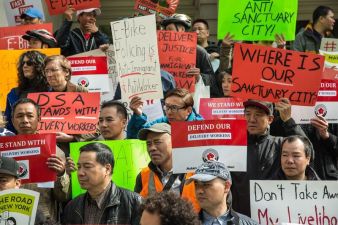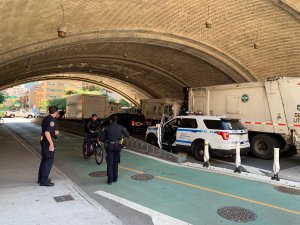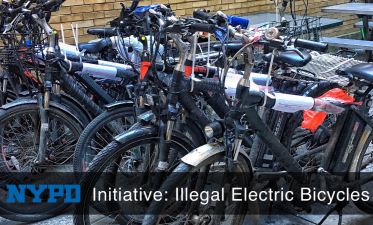Pedal-Assist E-Bike Legalization Leaves Delivery Workers Out in the Cold
The mayor and NYPD's crackdown on throttle-powered e-bikes has ravaged the city's immigrant delivery workforce.

Mayor de Blasio’s legalization of pedal-assist electric bikes goes into effect on Saturday. But for the city’s delivery workers, the policy change is not only meaningless, but cruel and unusual.
Most delivery workers use throttle-powered elected bikes — and have been the subject of an NYPD crackdown that began in earnest in January. But the mayor — in part to promote his dockless bike share pilot program and, in part, as a concession to critics of the crackdown — legalized only pedal-assisted e-bikes.
And that doesn’t help delivery workers, who can’t afford those pricier models.
“It’s great that some of the laws have been amended, but it doesn’t help the communities that we work with. The only people it helps is the corporations,” Asian American Federation Executive Director Jo-Ann Yoo said.
As the legislation was being hashed out, advocates lobbied DOT to allow workers to do their own conversions from throttle control to pedal-assist. They also called on the city to provide resources and education to workers who need their bikes converted.
The rule that goes into effect tomorrow makes only marginal concessions to advocates: The initial rule-change proposal required that bikes be “equipped at manufacturer” with pedal-assist capabilities [PDF]. The adopted rule now also allows for a manufacturer-labeled motors instead the bike itself [PDF].
DOT’s final rule, timed to coincide with the rollout of dockless bike-share, still prohibits true DIY conversions.
“That really does nothing,” said Make the Road NY’s Mel Gonzalez. “The problem is that if you convert your bike, you’re not going to get a label that comes from the manufacturer.
“What we had proposed to them was to make a label that didn’t come from the manufacture, that it could come from DOT or it could model state-level legislation, which doesn’t require that the label have to come from anywhere,” Gonzalez added.
The agency has promised to “work with manufacturers to facilitate appropriate aftermarket compliance” and amend the rules accordingly.
Meanwhile, the city is providing no resources to help immigrant delivery workers with the new regulations.
“There’s no outreach plan in place to let food delivery workers… to let them know that their bikes still are not legal,” said Biking Public Project organizer Helen Ho. “There’s no plan to convey this very basic information to the largest subset of people that are riding e-bikes currently, and there’s no plan to help get them legal vehicles.”
Speaking at an event in Staten Island yesterday to unveil bike-share company JUMP’s dockless e-bikes, DOT Commissioner Polly Trottenberg told AM New York the city has been meeting with advocates and is considering a program to aid throttle-to-pedal conversions.
But advocates say the city’s dragging its feet — and the livelihood of its immigrant workforce hangs in the balance.
“I appreciate that the city is listening and there were some modifications made,” said Yoo, of the Asian American Federation. “Unfortunately, the modifications don’t help the folks that we are advocating for.”
The mayor’s crackdown on e-bikes continues to wreak havoc on delivery workers. The $500 tickets for e-bike usage often result in the bikes being confiscated, a real hardship given that most workers provide their own bikes and work as independent contractors.
“My coworkers and I have been criminalized for using e-bikes,” delivery worker Clemente Martinez, 44, said at a hearing earlier this year. “On the other side, my boss is also demanding that I use e-bikes.”




